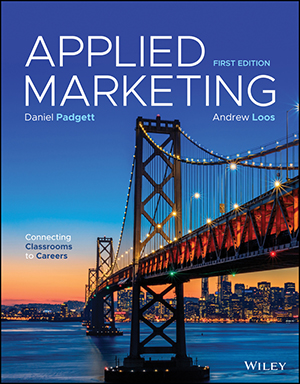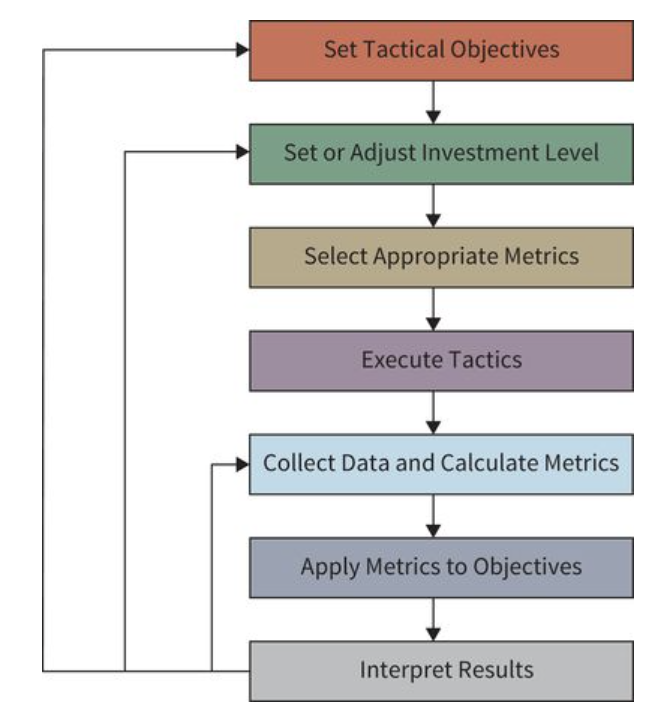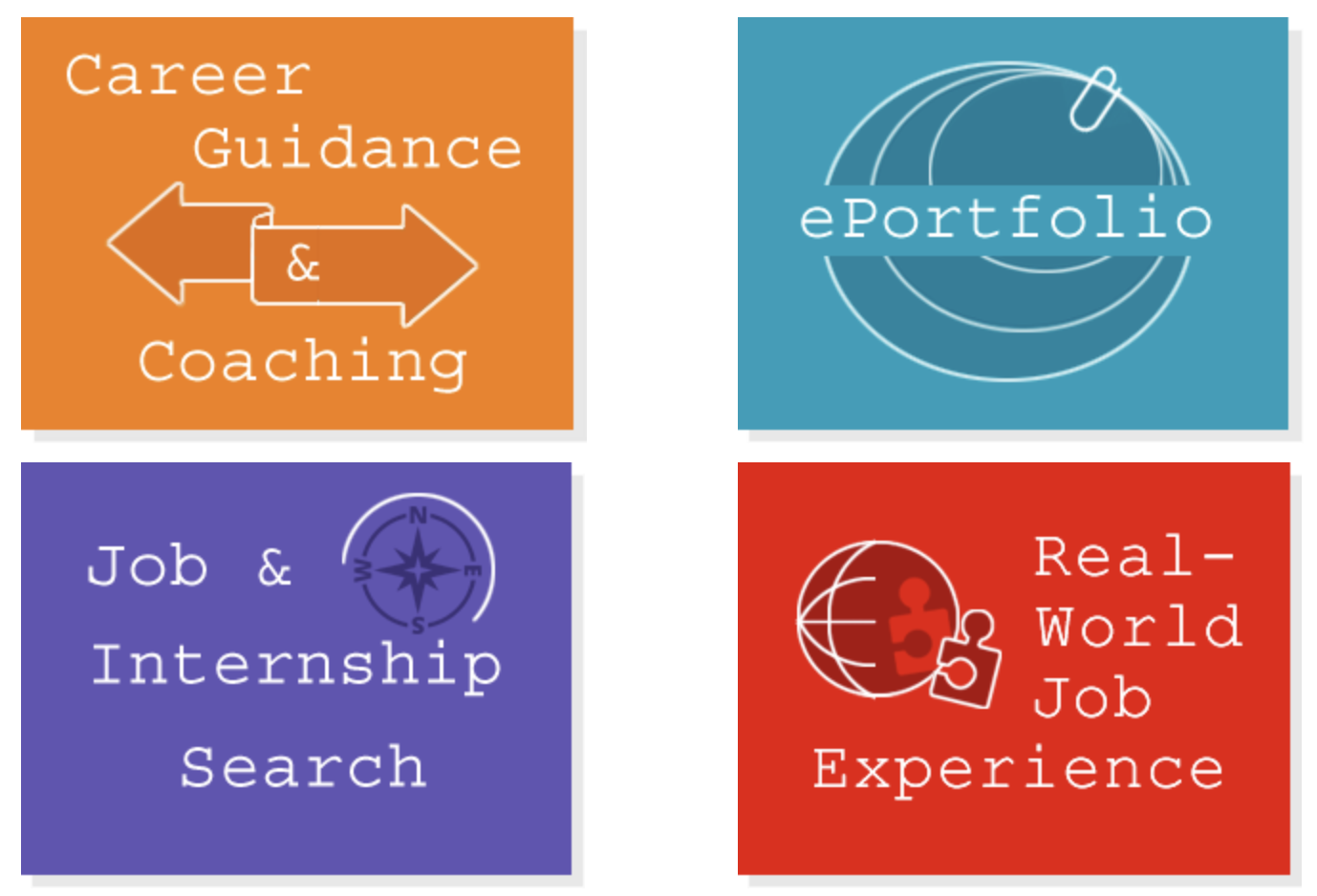
Applied Marketing, 1st Edition
By Daniel Padgett and Andrew Loos
Marketing is a rapidly changing field that impacts the success of every business and organization. Applied Marketing, 1st Edition, teaches principles of marketing students the core concepts of modern marketing theory, engages through an insider’s look into the latest business trends, and creates a foundation for making sound business decisions. Original videos like company field trips, expert insights, and recent graduates’ stories demonstrate how customer-centric marketing drives innovation in today’s world. To help students apply their learning and develop critical thinking skills, this product devotes an entire chapter to marketing metrics and integrates innovative cases – including a continuing case and video series on the socially conscious company This Bar Saves Lives. By the end of this course, students will begin to think and act like a modern marketer.
Schedule a Demo Request Instructor AccountWant to learn more about WileyPLUS? Click Here
Students Get an Insider’s Look into the Latest Marketing Trends.
Using original videos created specifically for this course, students see marketing come to life and get a deeper understanding of how it drives innovation in today’s business world. Examples of videos include:
- Company Field Trips give an inside look at how some of the best marketing teams in the country operate.
- Industry Expert Videos share powerful tips and give honest advice to students.
- Recent Graduate Videos include stories that reflect early career experiences.
- Author Roundtable Videos cover the main topics of each chapter in a conversational style.
- FAQ Videos feature the authors answering students’ top marketing questions
Students Apply Their Learning and Develop Critical Thinking Skills using Modern Case Studies.
Mini case studies are available for each chapter. In addition, a running case featuring the socially conscious company This Bar Saves Lives™, applies the principles covered throughout the course to a single company. This approach, along with corresponding videos and application exercises, helps students get a deeper learning experience and a front row seat into the complete cycle of a product launch.

Marketing Analytics is driving business innovation and students need knowledge and practice with data.
Beyond the basic coverage of marketing research, this course includes an entire chapter on measuring marketing effectiveness through metrics. Further, students can get additional practice working with data in the Data Analytics and Decision-making module found exclusively in WileyPLUS.

Connect Students to their Future Careers with Career Center Resources.
Career coaching videos, tools to create an e-portfolio, and job/internship search resources, and more are available for students to help them prepare for their future professions.
Instructor Resources
- Instructor’s Manual: Offers helpful teaching ideas, advice on course development, sample assignments, learning objectives, lecture outlines, class exercises, lecture notes, course section reviews, and more.
- Test Bank: Available in a printable, editable format and provides assessment questions that allow instructors to tailor examinations according to multiple learning outcomes.
- Lecture Slides: PowerPoint presentations cover key concepts allowing the instructor to illustrate important topics with images, figures, and problems presented throughout the course.

Daniel Padgett, Auburn University, earned his Ph.D. at Pennsylvania State University. Padgett has published in the Journal of Marketing, Journal of Marketing Research, Journal of Advertising, Journal of Interactive Marketing, Journal of Retailing, Journal of Current Issues andResearch in Advertising, Management International Review, Journal of Product and Brand Management, and Journal of Global Marketing, among others. He is on the editorial review boards of Psychology & Marketing and Marketing Education Review. He is a member of the American Marketing Association and the Society of Marketing Advances. Padgett has won teaching awards at the undergraduate and graduate levels. He is director of the College of Business summer internship programs in London, Dublin, and China. He has professional sales experience and has consulted with companies on topics such as sales compensation, sales forecasting, retailing, promotion strategy, marketing planning, and business development. He has trained marketing and sales managers in company-specific programs in the U.S. and internationally for Shanghai Jiao Tong University and the China Europe International Business School (CEIBS) in Shanghai and Ghana.

Andrew Loos co-founded Attack! Marketing in 2001 as an event marketing agency and over the past decade turned it into one of the top players in the wider experiential marketing space. His programs have pioneered market entry and brand dominance for companies such as Kellogg’s, Pepsi, Macy’s, Redbox, and T-Mobile. Today Attack! has four offices across the U.S. and serves global brands in marketing strategy, rebranding, new brand activation, and hyper-local immersion. As CEO, Loos contributes to the larger industry dialogue, and his expertise has been featured in Inc., Fast Company, Event Marketer, PROMO, Experiential Marketing Forum (where he is an advisory board member), and Chief Marketer. Loos has been a keynote speaker at major conferences, including Google’s “ForumCon” and Appalachian State University’s “Entrepreneur Week,” and recently shared his expertise in an interview with Adweek (). Loos’ recent publications include: Forbes, “Three Ways to Improve Communication with Clients”; Washington Post, “How Thinking Like a Big Company Can Help You Become One”; and Distilled (featured), “Brandopolis: How the World’s Biggest Brands Make Their Mark Online”.
1. What is Marketing
2. Marketing Strategy
3. The Marketing Environment
4. Customer Behavior
5. Research in Marketing
6. Segmentation, Targeting, and Positioning
7. Applying the Marketing Mix
8. Products, Brands, and Customer Needs
9. Place Decisions and Customer Convenience
10. Managing Price and Customer Cost Perceptions
11. Promoting to Communicate with Customers
12. Encouraging Participation to Connect with Customers
13. Measuring Marketing Effectiveness Through Metrics
14. Developing an Integrated Marketing Mix
15. Finalizing a Marketing Plan

